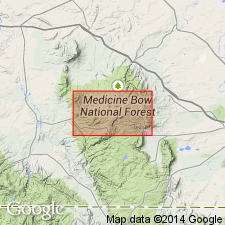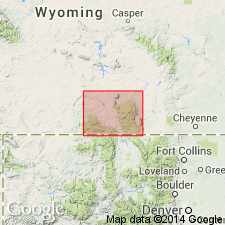
- Usage in publication:
-
- Rock Knoll Formation
- Modifications:
-
- Named
- Dominant lithology:
-
- Quartzite
- AAPG geologic province:
-
- Northern Rocky Mountain region
Summary:
Named as the upper formation (of 6) of Deep Lake Group (raised in stratigraphic rank) for exposures (the type section) on southeast face of Rock Creek Knoll, sec 35, T17N, R79W, Carbon Co, WY in the Northern Rocky Mountain region. Is 1,246 ft thick at type measured section where: its lower contact is a fault with phyllite of the underlying Vagner Formation; its upper contact is concealed, but to east is a fault contact with Headquarters Formation of Libby Creek Group; its content is massive, white to gray, fine- to medium-grained quartzite. Has phyllitic partings, conglomeratic layers of quartz, quartzite, and granite pebbles up to 5 cm in diameter. Is ripple-marked. Has tabular cross-bedding. Probably deposited in a shallow-water marine environment. Crops out in east and west parts of area; removed from central portion by erosion. Geologic map; stratigraphic charts. Early Proterozoic age. Of shallow marine and fluvial origin.
Source: GNU records (USGS DDS-6; Denver GNULEX).

- Usage in publication:
-
- Rock Knoll Formation*
- Modifications:
-
- Revised
- AAPG geologic province:
-
- Northern Rocky Mountain region
Summary:
Is a formation in the Medicine Bow Mountains of WY, Northern Rocky Mountain region, formerly assigned to the Deep Lake Group as the uppermost formation, that is reassigned to the younger Libby Creek Group as its basal formation. Deep Lake Group is the lowest group of the newly defined Snowy Pass Supergroup. The reasons for its reassignment are: 1) the unconformable contact with the overlying Headquarters Formation of the Libby Creek is depositional; 2) the contact with the underlying Vagner Formation of the Deep Lake is thought to be a thrust fault--the Reservoir Lake fault. Is 0-380 m thick. Correlates with part of the Bottle Creek Formation (new) of Snowy Pass Group in the Sierra Madre. Geologic map; correlation chart. Of Early Proterozoic age.
Source: GNU records (USGS DDS-6; Denver GNULEX).
For more information, please contact Nancy Stamm, Geologic Names Committee Secretary.
Asterisk (*) indicates published by U.S. Geological Survey authors.
"No current usage" (†) implies that a name has been abandoned or has fallen into disuse. Former usage and, if known, replacement name given in parentheses ( ).
Slash (/) indicates name conflicts with nomenclatural guidelines (CSN, 1933; ACSN, 1961, 1970; NACSN, 1983, 2005, 2021). May be explained within brackets ([ ]).

